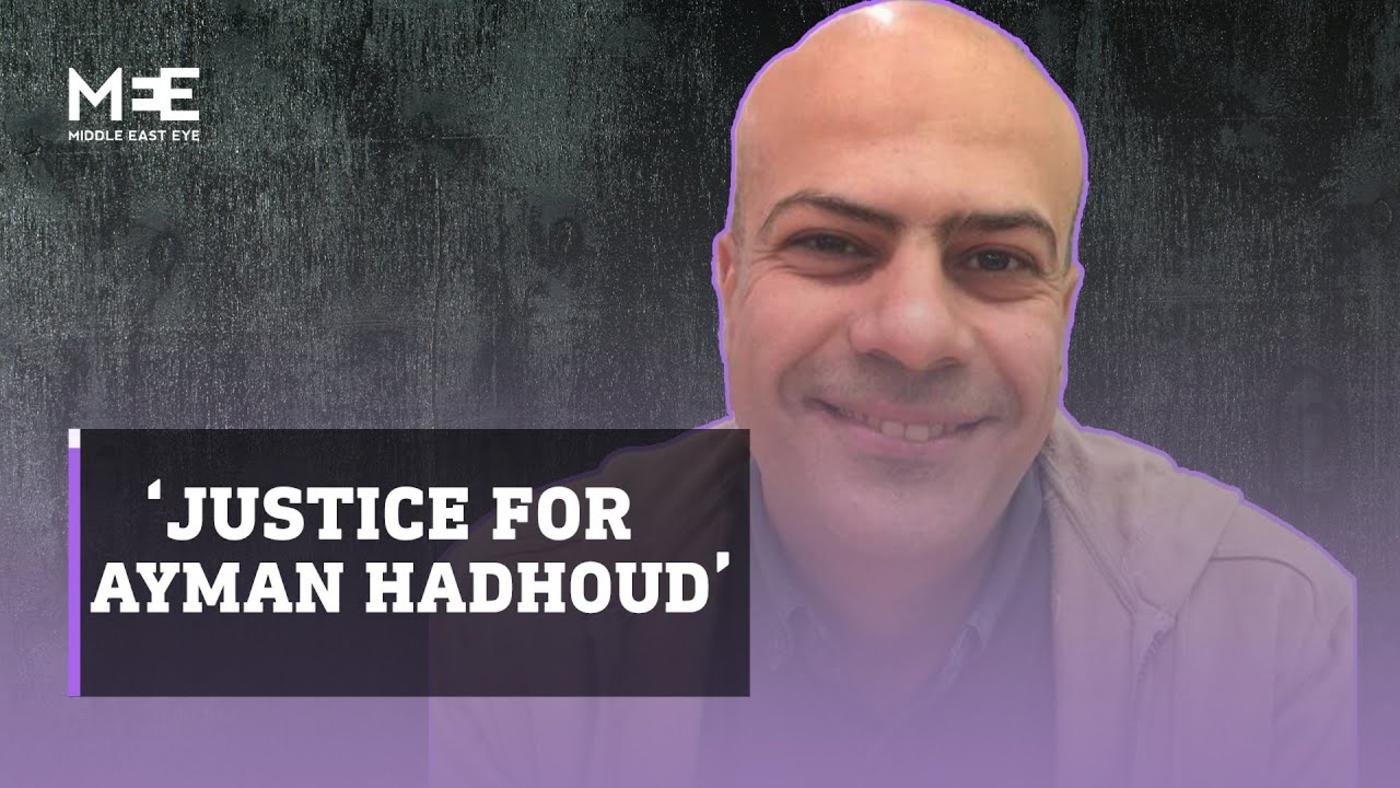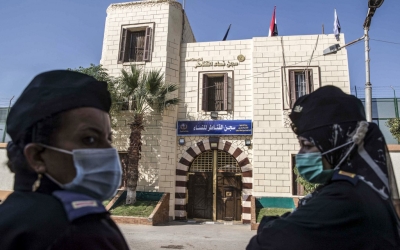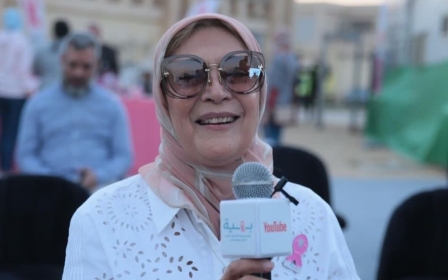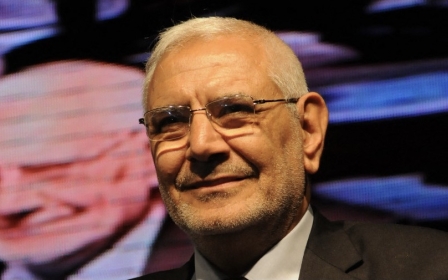Egypt: How an economist was found dead two months after arbitrary detention
Outside Cairo's Abbasiya Mental Health Hospital, five security guards gathered to watch the latest pirated episode of Al-Ikhtyar 3, a pro-government, action-packed, hyper-nationalist Ramadan TV drama where all officers are depicted as moral, neat, patriotic, and willing to make sacrifices.
Inside the same hospital, the family of Ayman Mohamed Ali Hadhoud, an Egyptian economist who was missing since February, were witnessing a different side of the country's police officers.
'They neither respected him while he was alive nor when he was dead'
- Family source
Since the end of February, almost 11 days after Hadhoud was unlawfully detained by National Security Apparatus agents, the family had descended on the hospital hoping to visit their relative who reportedly needed psychiatric evaluation, Hadhoud's family told Middle East Eye.
But on Saturday, Hadhoud's relatives were asked to collect his body from the hospital, over two months after he disappeared.
Hadhoud joins a growing list of prisoners who have lost their lives in detention as a result of ill-treatment, torture, or lack of medical care. Hadhoud's family told MEE that they suspect he was killed, and fear a cover-up by the interior ministry is being planned.
New MEE newsletter: Jerusalem Dispatch
Sign up to get the latest insights and analysis on Israel-Palestine, alongside Turkey Unpacked and other MEE newsletters
On Monday, the prosecution ordered an autopsy of the economist who also was a founding member of Egypt's liberal Reform and Development Party, while members of his family were interrogated by the prosecution.
In search of Ayman
The journey to find Hadhoud started on 6 February, a day after he was taken from his house in Cairo by NSA officers and transferred to Amiriya police station.
The family said that despite an official denial by officers and high-ranking figures in the station that Hadhoud was in their custody - a common practice in Egypt's law enforcement facilities - on 8 February a low-ranking officer confirmed that he was detained at the station.
After a week of being left in limbo with no contact, the family was informed on 16 February that Hadhoud had been transformed to Abbasiya Mental Health Hospital for a 45-day psychiatric evaluation.
"We anticipated that he had a nervous breakdown from the amount of questioning and torture, but we were glad that he was alive," a family member, who requested anonymity, told MEE.
However, after arriving at the hospital, police officers denied that Hadhoud was present.
Despite the lack of information, the family sent telegrams to the general prosecution, the interior minister, the National Council of Human Rights, as well as several influential politicians.
The family also said that they contacted Mohamed Anwar al-Sadat, a member of the National Council for Human Rights, and the head of the Reform and Development Party.
Sadat has been active in negotiations with government officials to release some political prisoners. MEE attempted to reach Sadat, but he was not immediately available for comment.
Wild goose chase
After pressure and intervention from some political figures, the family said the hospital confirmed that Hadhoud was present at the facility, but due to the "special position'' of the section he was kept in, he could not be visited or allowed food or medicine.
A source at the hospital told MEE that the section where Hadhoud was being kept belongs to the Forensic Medicine Department, which is overseen by the interior ministry, and the department acts as a detention centre for suspects or convicts who require a psychiatric evaluation.
The family visited the hospital on an almost daily basis and delegated lawyers and aides to visit and inquire about the charges in prosecution offices all over Cairo.
"In order to visit him in the special detention centre inside the hospital, we had to have a permit from the public prosecution," the family said.
However, at the prosecution's office, they were surprised to hear that there were no files or records that documented what the late researcher had been charged with.
"This means that he was transported to the hospital without the approval or order from the prosecution," the family source said.
On 9 April, Hadhoud's brother, Omar, received a call informing him that he had died, only to discover that his death took place 35 days earlier, on 5 March.
The family source said they found out that there was "an attempt to bury the body in a charity-oriented cemetery in a possible attempt to hide the evidence".
"Ayman had his documents, was known to the officers who arrested him and was registered under his name at the hospital. How come they want to bury him as if he was a homeless or an unregistered person," the source said. "They neither respected him while he was alive nor when he was dead."
Signs of beating
According to one relative, Hadhoud's body - which was seen by the family - had signs of beatings and injuries over his neck and chest.
Members of the family, including the brother, were summoned by the prosecution for questioning on Monday.
When the family took pictures of the body as proof of the injuries, hospital staff threatened not to release the body unless they deleted the photos, the family source said.
It's common practice for the interior ministry to rush the burial of people who die in police custody in order to hide tangible evidence of any possible violations.
In response to legal pressure, the ministry published a short statement claiming that Hadhoud was arrested on suspicion of breaking into an apartment.
It also said that news about his enforced disappearance was disseminated by social media pages belonging to the now-outlawed Muslim Brotherhood opposition group.
Meanwhile, his family said that according to hospital records, he was accused of stealing a car in the governorate of Daqahlia.
Case goes viral
A source with the interior ministry's media centre told MEE that "officials published a statement of Hadhoud’s death but did not anticipate that the case would go viral".
The source added that high-ranking ministry members have held meetings at the ministry's main building on Sunday and Monday to discuss the case.
Hadhoud's death has sparked outrage in Egypt, which is suffering from an epidemic of police violations and abuse in detention facilities.
'Ayman was not active online nor did he share radical criticism of the regime or the country’s economic policies'
- Friend
A friend of Hadhoud told MEE that the economist was a calm and considerate person and that he hailed from a well-off background.
"Accusing him of breaking and entering or stealing a car is a stunt so the police can get away with the truth," he said.
"Ayman's work was not supercritical, and he was not active online, nor did he share radical criticism of the regime or the country’s economic policies."
Several of Hadhoud's colleagues mourned him while some activists described him as another Giulio Regeni, referring to the Italian graduate student who was arrested and killed by the Egyptian police officers in 2016.
Ayman graduated from the School of Business Administration at the American University in Cairo (AUC) and later obtained an MBA from the same university.
He also worked as a financial advisor with AUC as well as United Nations Development Programme to help small and medium-sized companies fight corruption and bribery.
Middle East Eye delivers independent and unrivalled coverage and analysis of the Middle East, North Africa and beyond. To learn more about republishing this content and the associated fees, please fill out this form. More about MEE can be found here.






